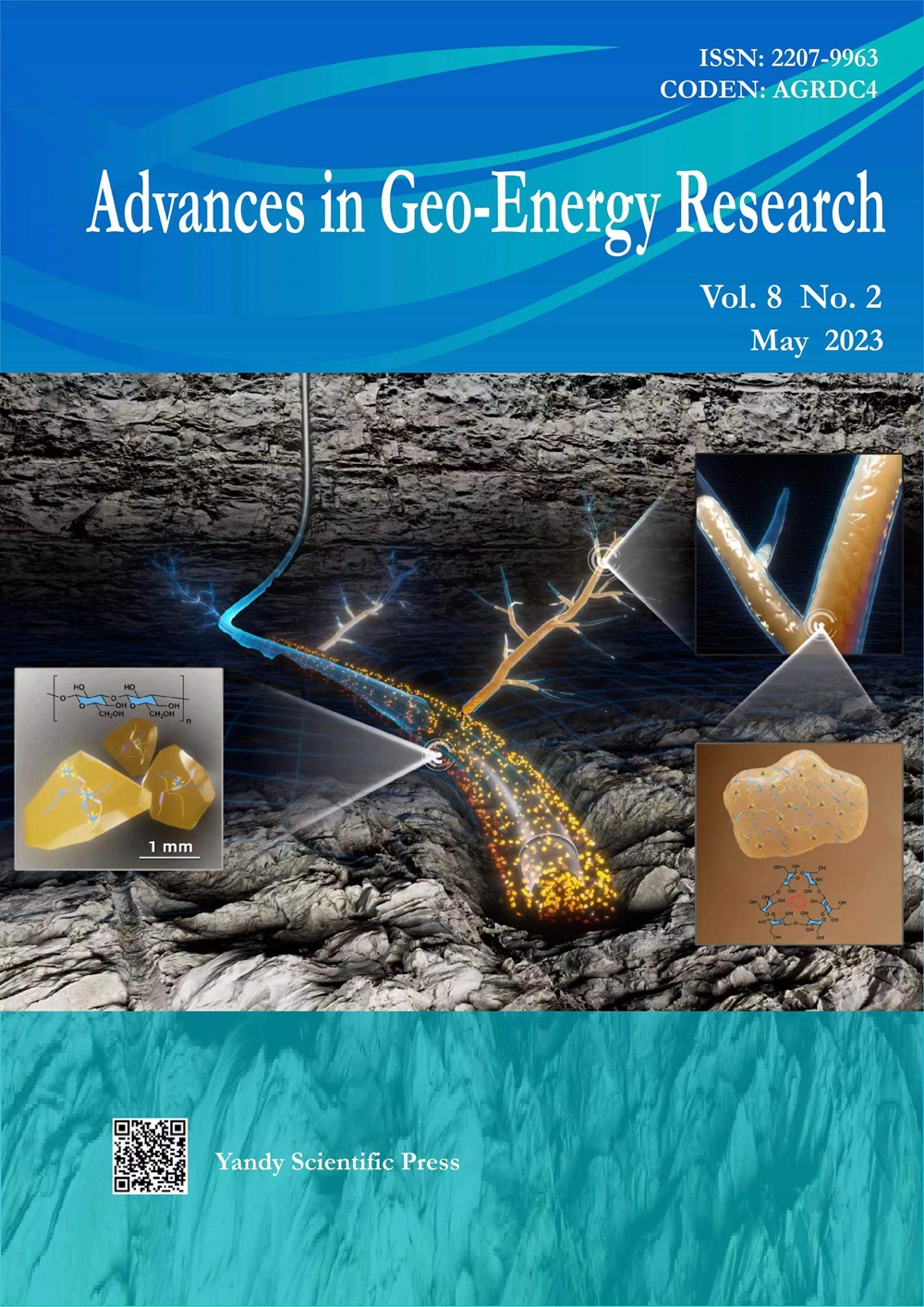热水循环在非均质深层蓄水层储存太阳能的可行性分析:来自耦合水热模拟的见解
IF 10
1区 地球科学
Q1 ENERGY & FUELS
引用次数: 0
摘要
将太阳能以热能的形式储存在地下是一种很有前途的能量储存和转换方式,它在解决能源需求和供应的时空不匹配方面具有很大的潜力。深层蓄水层的热能储存可以将间歇性的太阳能转化为稳定的高温地热能。本研究提出了一种新的太阳能存储和转换系统,该系统首先利用抛物线槽将太阳能转化为热量,然后通过高温热水循环储存在深层含水层中。采用地质统计建模和水热耦合模拟方法,探讨了深层蓄水层太阳能蓄能的可行性和效率。具体而言,研究了岩石渗透率非均质性(自相关长度和整体渗透率非均质性)如何影响温度分布和储存效率的时空演变。模拟结果表明,水平自相关长度的增加和整体非均质性的增加会加速热突破,降低存储效率。高渗透率非均质性也可能导致高注入压力。水平自相关长度小、整体非均质性低的深层含水层往往具有较高的蓄水效率。这些发现有助于提高我们对深层含水层太阳能蓄能机理的认识,并指导现场应用。文献类型:原论文引号:王勇,钟锴,高勇,孙忠,董仁,王旭。热水循环在非均质深层含水层中储存太阳能的可行性分析:来自耦合水热模拟的见解。地球能源研究进展,2023,10(3):159-173。https://doi.org/10.46690/ager.2023.12.03本文章由计算机程序翻译,如有差异,请以英文原文为准。
Feasibility analysis of storing solar energy in heterogeneous deep aquifer by hot water circulation: Insights from coupled hydro-thermo modeling
Storing solar energy in the subsurface as heat is a promising way for energy storage and conversion, which has a great potential to address the temporal and spatial mismatch between energy demand and supply. Thermal energy storage in deep aquifers can convert intermittent solar energy into stable high temperature geothermal energy. In this study, a new solar energy storage and conversion system is proposed where solar energy is firstly converted into heat using parabolic troughs and then stored in deep aquifers by high temperature hot water circulation. The geostatistical modelling and hydro-thermo coupling simulations are adopted to investigate the feasibility and efficiency of solar energy storage in deep aquifers. Specifically, how rock permeability heterogeneity (in terms of autocorrelation length and global permeability heterogeneity) impacts the temporal and spatial evolution of temperature distribution and storage efficiency is examined. The simulation results indicate that increased horizontal autocorrelation length and global heterogeneity may accelerate thermal breakthrough, deteriorating storage efficiency. High permeability heterogeneity may also lead to high injection pressure. Deep aquifers with small horizontal autocorrelation lengths and low global heterogeneity tend to have higher storage efficiency. These findings may improve our understanding of solar energy storage mechanism in deep aquifers and guide field applications. Document Type: Original article Cited as: Wang, Y., Zhong, K., Gao, Y., Sun, Z., Dong, R., Wang, X. Feasibility analysis of storing solar energy in heterogeneous deep aquifer by hot water circulation: Insights from coupled hydro-thermo modeling. Advances in Geo-Energy Research, 2023, 10(3): 159-173. https://doi.org/10.46690/ager.2023.12.03
求助全文
通过发布文献求助,成功后即可免费获取论文全文。
去求助
来源期刊

Advances in Geo-Energy Research
natural geo-energy (oil, gas, coal geothermal, and gas hydrate)-Geotechnical Engineering and Engineering Geology
CiteScore
12.30
自引率
8.50%
发文量
63
审稿时长
2~3 weeks
期刊介绍:
Advances in Geo-Energy Research is an interdisciplinary and international periodical committed to fostering interaction and multidisciplinary collaboration among scientific communities worldwide, spanning both industry and academia. Our journal serves as a platform for researchers actively engaged in the diverse fields of geo-energy systems, providing an academic medium for the exchange of knowledge and ideas. Join us in advancing the frontiers of geo-energy research through collaboration and shared expertise.
 求助内容:
求助内容: 应助结果提醒方式:
应助结果提醒方式:


